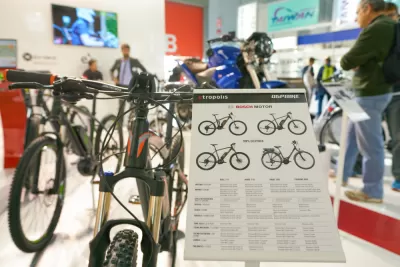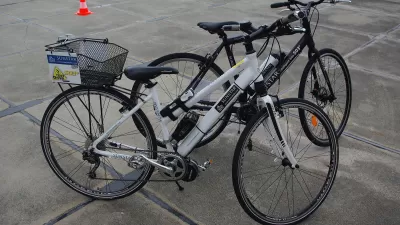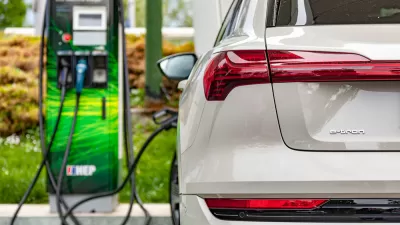The world, including the United States, could be entering a new era of personal mobility.

Andrew J. Hawkins shares news of a new report from Deloitte that predicts big things for the electric bicycle (e-bike) market over the next few years.
Deloitte, which released its annual technology, media, and telecommunications predictions [pdf] last week, says it expects 130 million e-bikes to be sold globally between 2020 and 2023. It also noted that “the number of e-bikes on the roads will easily outpace other e-vehicles by the end of next year.”
Hawkins admits incredulity with the idea that e-bikes might sell in larger quantities than other forms of electric vehicles, namely electric cars. But the report makes a solid case for a forthcoming, dramatic shift in how people get around, according to Hawkins.
Indeed, Deloitte predicts a 1 percentage point rise in the proportion of people who bike to work from 2019 to 2022. That may not seem like much on the surface, but given the low bases, the difference will be impressive. Tens of billions of additional bicycle rides per year means fewer car trips and lower emissions, with spillover benefits for traffic congestion and urban air quality.
Deloitte isn't alone its e-bike optimism, according to Hawkins. Other reports, as well as experts cited in the article, agree.
FULL STORY: Forget electric cars — e-bikes will be the top selling EV in the next decade

Planetizen Federal Action Tracker
A weekly monitor of how Trump’s orders and actions are impacting planners and planning in America.

Restaurant Patios Were a Pandemic Win — Why Were They so Hard to Keep?
Social distancing requirements and changes in travel patterns prompted cities to pilot new uses for street and sidewalk space. Then it got complicated.

Map: Where Senate Republicans Want to Sell Your Public Lands
For public land advocates, the Senate Republicans’ proposal to sell millions of acres of public land in the West is “the biggest fight of their careers.”

Maui's Vacation Rental Debate Turns Ugly
Verbal attacks, misinformation campaigns and fistfights plague a high-stakes debate to convert thousands of vacation rentals into long-term housing.

San Francisco Suspends Traffic Calming Amidst Record Deaths
Citing “a challenging fiscal landscape,” the city will cease the program on the heels of 42 traffic deaths, including 24 pedestrians.

California Homeless Arrests, Citations Spike After Ruling
An investigation reveals that anti-homeless actions increased up to 500% after Grants Pass v. Johnson — even in cities claiming no policy change.
Urban Design for Planners 1: Software Tools
This six-course series explores essential urban design concepts using open source software and equips planners with the tools they need to participate fully in the urban design process.
Planning for Universal Design
Learn the tools for implementing Universal Design in planning regulations.
Heyer Gruel & Associates PA
JM Goldson LLC
Custer County Colorado
City of Camden Redevelopment Agency
City of Astoria
Transportation Research & Education Center (TREC) at Portland State University
Camden Redevelopment Agency
City of Claremont
Municipality of Princeton (NJ)





























